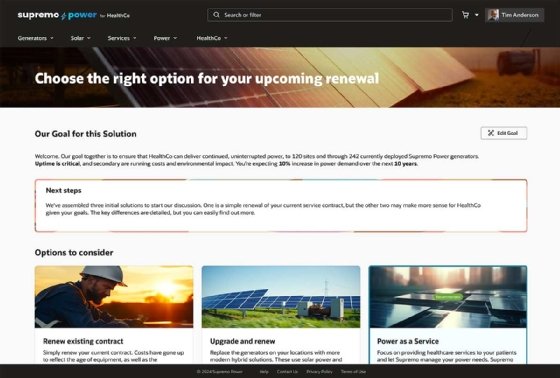
Getty Images/iStockphoto
Oracle focuses on CX platform as it exits ad business
Oracle rolls out generative AI tools for sellers, beefs up CDP to reinforce B2B buying and selling team interactions, and adds industry-specific features.
Oracle may be shutting down its online advertising products, but it has redoubled its investment in CX with an emphasis on technology that enables B2B buying as well as subscription and consumption models.
The company rolled out new features for Fusion Cloud Customer Experience and the Unity Customer Data Platform during the Oracle CloudWorld conference on Wednesday. Oracle CX users can now analyze customer profiles to build B2B buying teams for customers, use generative AI tools such as native analytics, and tap industry-specific accelerators to speed the adoption of customer data tools.
Some of those include the ability to build customer self-service sites for individual accounts that can review contracts and summarize them with generative AI, get quotes for goods and services and renew subscriptions. Other features include "assisted buying experiences," a mix of self-service and human service and tools to ease full-service sales, such as account onboarding and generative AI tools that help salespeople draft customer emails.
Subscription models are just getting started in B2B, said Liz Miller, an analyst at Constellation Research, but they are complicated to support with technology.
That may seem surprising in a time when "subscription fatigue" has emerged as a figure of speech on the consumer side. But for B2B buyers, subscriptions offer a quick and appealing alternative to standard operating procedures.
"It's easy," Miller said. "Most of us in B2B still carry the battle scars of yearlong procurement buying cycles just to get an increase of one seat in your commerce license. The pain and grist of what used to be B2B buying is still very fresh in everyone's mind."
Oracle Advertising ends this month
In its June earnings call, Oracle CEO Safra Catz said the company will shut down Oracle Advertising product support on Sept. 30. The advertising data management platform (DMP) was built from software acquired from BlueKai a decade ago.
Oracle is not alone in killing its DMP; Salesforce unplugged Audience Studio in 2021. Microsoft continues to maintain and add generative AI features to its DMP, in part because of its Bing ad platform, one of Google's biggest competitors. But Oracle winding down its ad platform should not be taken as a sign that the company is de-emphasizing CX, Pinkerton said.
In fact, Oracle founder and chief technology officer Larry Ellison has been involved in evolving the company's CX strategy, having emphasized Oracle's marketing as well as Apex low-code tools in public appearances and behind closed doors, said Oracle senior vice president Rob Pinkerton.
"Front-office [applications like CX are] more complicated than back office," Pinkerton said. "We're getting good marks in the technology strategy realm, and we feel good about the business.”
Miller said that in the last five years, Oracle kept the best, most usable features in its CX apps, lopped off a lot of others, and laid off hundreds of employees in its CX division. Oracle now maintains a modernized, composable CX suite based on the Fusion cloud platform. The question is, is it too late?
"Oracle as a CX [platform] has fallen off the radar of a vast number of buyers," Miller said. "I don't have people coming to me and sweating, saying, 'Oh my God. I really can't decide between Microsoft and Salesforce and Oracle.'"

Oracle adds industry-specific tools
Like its competitors with CX platforms, such as Microsoft and Salesforce, Oracle also added industry-specific features to accelerate adoption of its CDP in several sectors, including high tech, industrial manufacturing, professional services, telecommunications, utilities, financial services, travel and retail.
While Oracle moved all of its CX apps to the Fusion platform several years ago, the platform wasn't mature enough to handle the complexity of its customers' needs, said Rebecca Wettemann, CEO of Valoir, an independent research firm. Fusion has evolved into something that can better handle industry challenges with a modular approach and generative AI enhancements.
"Common components -- such as customer interaction summaries -- can be adapted and delivered across multiple industries with a faster time to value than traditional applications," Wetteman said, referencing Oracle Health apps. "Clinical Digital Assistant is a great example of this."
Don Fluckinger is a senior news writer for TechTarget Editorial. He covers customer experience, digital experience management and end-user computing. Got a tip? Email him.






